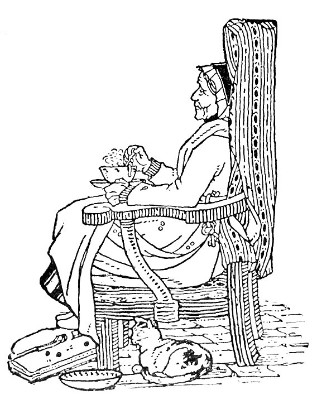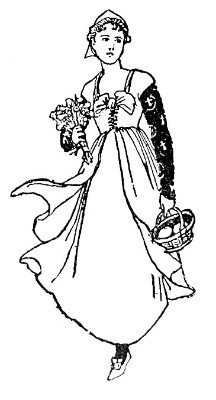| Web
and Book design,
Copyright, Kellscraft Studio 1999-2007 (Return to Web Text-ures) |
 (HOME)
|
|
BLANCH AND
ROSALINDA  N a pleasant
village, some miles from the metropolis, there lived a very good sort
of woman,
who was much beloved by all her neighbours, because she was always
ready to
assist every one who was in need. She had received in her youth a
better
education than the inhabitants of the little village in which she
dwelt, and
for this reason the poor people looked up to her with a degree of
respect. She was
the widow of a very good man, who, when he died, left her with two
children.
They were very pretty girls. The eldest, on account of the fairness of
her
complexion, was named Blanch, and the other Rosalinda, because her
cheeks were
like roses, and her lips like coral. One day, while Good Hearty sat
spinning at
the door, she saw a poor old woman going by, leaning on a stick, who
had much
ado to hobble along. ‘You seem very much tired, dame,’ said she to the
old
woman, ‘sit down here and rest yourself a little; ‘at the same time,
she bid
her daughters fetch a chair they both went, but Rosalinda ran fastest,
and
brought one. ‘Will you please to drink?’ said Good Hearty. ‘Thank you,’
answered the old woman, ‘I don’t care if I do; and methinks if you had
any thing
nice that I
liked, I could eat a
bit.’ — ‘You are welcome to the best I have in my house,’ said Good
Hearty;
‘but as I am poor, it is homely fare.’ N a pleasant
village, some miles from the metropolis, there lived a very good sort
of woman,
who was much beloved by all her neighbours, because she was always
ready to
assist every one who was in need. She had received in her youth a
better
education than the inhabitants of the little village in which she
dwelt, and
for this reason the poor people looked up to her with a degree of
respect. She was
the widow of a very good man, who, when he died, left her with two
children.
They were very pretty girls. The eldest, on account of the fairness of
her
complexion, was named Blanch, and the other Rosalinda, because her
cheeks were
like roses, and her lips like coral. One day, while Good Hearty sat
spinning at
the door, she saw a poor old woman going by, leaning on a stick, who
had much
ado to hobble along. ‘You seem very much tired, dame,’ said she to the
old
woman, ‘sit down here and rest yourself a little; ‘at the same time,
she bid
her daughters fetch a chair they both went, but Rosalinda ran fastest,
and
brought one. ‘Will you please to drink?’ said Good Hearty. ‘Thank you,’
answered the old woman, ‘I don’t care if I do; and methinks if you had
any thing
nice that I
liked, I could eat a
bit.’ — ‘You are welcome to the best I have in my house,’ said Good
Hearty;
‘but as I am poor, it is homely fare.’
Having
said this,
the fairy went away, leaving both mother and daughters greatly
astonished. They
went into the farm-house, and were quite charmed with the neatness of
the
furniture: the chairs were only wood, but so bright, you might see your
face in
them. The beds were of linen-cloth, as white as snow. There were forty
sheep in
the sheep-pen; four oxen and four cows in their stalls; and in the yard
all
sorts of poultry — hens, ducks, pigeons, &c. There was also a
pretty
garden, well stocked with flowers, fruit, and vegetables. Blanch saw
the
fairy’s gift to her sister, without being jealous, and was wholly taken
up with
the thoughts of being a queen; when, all of a sudden, she heard some
hunters
riding by, and going to the gate to see them, she appeared so charming
in the
king’s eyes, that he resolved to marry her. When Blanch was a queen,
she said
to her sister Rosalinda, ‘I do not care you should be a farmer. Come
with me,
sister, and I will match you to some great lord.’ — ‘I am very much
obliged to
you, sister,’ replied Rosalinda, ‘but I am used to a country life, and
I choose
to stay where I am.’ Queen Blanch arrived at her palace, and was so
delighted
with her new dignity, that she could not sleep for several nights: the
first
three months, her thoughts were wholly engrossed by dress, balls, and
plays, so
that she thought of nothing else. She was soon accustomed to all this,
and
nothing now diverted her; on the contrary, she found a great deal of
trouble.
The ladies of the court were all very respectful in her presence, but
she knew
very well that they did not love her; and, when out of her sight, would
often
say to one another, ‘See, what airs this little country girl gives
herself;
sure his Majesty must have a very mean fancy, to make choice of such a
consort.’
These discourses soon reached the king’s ears, and made him reflect on
what he
had done: he began to think he was wrong, and repented his marriage.
The
courtiers saw this, and accordingly paid her little or no respect: she
was very
unhappy, for she had not a single friend to whom she could declare her
griefs;
she saw it was the fashion at court to betray the dearest friend for
interest;
to caress and smile upon those they most hated; and to lie every
instant. She
was obliged to be always serious, because they told her, a queen ought
to look
grave and majestic. She had several children, and all the time there
was a
physician to inspect whatever she eat or drank, and to order every
thing she
liked off the table: not a grain of salt was allowed to be put in her
soup, nor
was she permitted to take a walk, though she had ever so much a mind to
it.
Governesses were appointed to her children, who brought them up
contrary to her
wishes; yet, she had not the liberty to find fault. Poor queen Blanch
was dying
with grief, and grew so thin, that it was a pity to see her. She had
not seen
her sister for three years, because she imagined it would disgrace for
a person
of her rank and dignity to visit a farmer’s wife. Her extreme
melancholy made
her very ill, and her physicians ordered change of air. She therefore
resolved
to spend a few days in the country, to divert her uneasiness, and
improve her
health.
Rosalinda
was
married to a farmer’s son, who had no fortune of his own, — but then he
ever
remembered, that he was indebted to his wife for every thing he had;
and he
strove to show his gratitude by his obliging behaviour. Rosalinda had
not many
servants; but those she had, loved her as though she had been their
mother,
because she used them kindly. She was beloved by all her neighbours,
and they
all endeavoured to show it. She neither had, nor wanted, much money:
corn,
wine, and oil, were the growth of her farm: her cows supplied her with
milk,
butter, and cheese. The wool of her sheep was spun to clothe herself,
her
husband, and two children she had. They enjoyed perfect health; and
when the
work of the day was over, they spent the evening in all sorts of
pastimes.
‘Alas!’ cried the queen, the fairy made me a sad present in giving me a
crown.
Content is not found in magnificent palaces, but in an innocent country
life.’
Scarce had she done speaking, before the fairy appeared. ‘In making you
a
queen,’ said the fairy, ‘I did not intend to reward, but punish you,
for giving
me your plums with an ill-will. To be contented and happy, you must,
like your
sister, possess only what is necessary, and wish for nothing else.’ —
‘Ah!
madam,’ cried Blanch, ‘you are sufficiently revenged: pray, put an end
to my
distress.’ — ‘It is at an end,’ said the fairy; ‘the king, who loves
you no
longer, has just married another wife, and tomorrow his officers will
come to
forbid you returning any more to the palace.’ — It happened just as the
fairy
had foretold; and Blanch passed the remainder of her days with her
sister
Rosalinda, in all manner of happiness and content: never thought again
of
court, unless it was to thank the fairy for having brought her back to
her
native village. |
